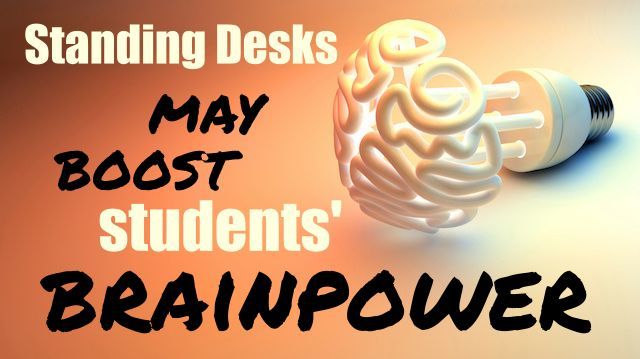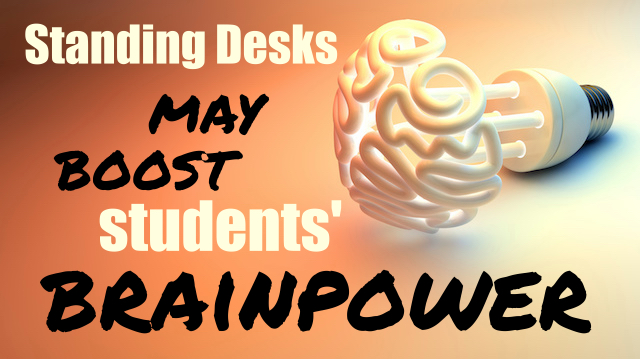
For generations, students have been told to sit down at their desks for their daily lessons. Except for gym class and occasional field trips, students of all ages generally spend most of their school day sitting down.
However, we now know that sitting down all day can be extremely detrimental to our health — to our hearts, muscles, and to our spines. Obesity is on the rise, and our sedentary habits play a major role in the problem.
In order to lessen the amount of time we spend sitting, some schools and offices have implemented standing desks. This is by far healthier, and people have been found to burn more calories when standing, which is a definite plus.
Now, a recent study performed at Texas A&M and published in the International Journal of Environmental Research and Public Health has found that using a standing desk, as opposed to a traditional sit-down desk, may have cognitive benefits, as well.
According to Mark Benden, director of the Texas A&M Ergonomics Center and co-researcher of the study:
“There has been lots of anecdotal evidence from teachers that students focused and behaved better while using standing desks. This is the first examination of students’ cognitive responses to the standing desks, which to date have focused largely on sedentary time as it relates to childhood obesity.”
On standing desks, the study authors wrote:
“These are elevated desks that allow for the students to have the option to stand or sit on a stool, thereby offering the potential to expend more energy during instructional activities and academic assignments. There is consensus on the effectiveness of stand-biased desks to help increase energy expenditure of children during the school day (~17% improvement in calorie expenditure when compared to traditional desks), which have also shown to cause no discomfort to students.”
For their study, researchers gave a group of 34 high school freshmen neurocognitive tests in the fall semester, and again in the spring semester, to test their “executive function and working memory.” During the 27 weeks between the fall and spring semesters, the students used standing desks.
According to a Texas A&M press release:
 “Executive functions are cognitive skills we all use to analyze tasks, break them into steps and keep them in mind until we get them done. These skills are directly related to the development of many academic skills that allow students to manage their time effectively, memorize facts, understand what they read, solve multi-step problems and organize their thoughts in writing.”
“Executive functions are cognitive skills we all use to analyze tasks, break them into steps and keep them in mind until we get them done. These skills are directly related to the development of many academic skills that allow students to manage their time effectively, memorize facts, understand what they read, solve multi-step problems and organize their thoughts in writing.”
Results of the study showed that the students displayed, “significant improvements in executive function and working memory capabilities.” On their findings, the study authors wrote:
“These findings provide the first preliminary evidence on the neurocognitive benefits of standing desks, which to date have focused largely on energy expenditure. Findings obtained here can drive future research with larger samples and multiple schools, with comparison groups that may in turn implicate the importance of stand-biased desks, as simple environmental changes in classrooms, on enhancing children’s cognitive functioning that drive their cognitive development and impact educational outcomes.”
The researchers also added that implementing these desks would not “tax school resources,” therefore making for a relatively inexpensive, practical solution to helping kids do better in school. If implemented nationwide, this could be promising, indeed.
We could all use more time standing and less time sitting. If you’re still sitting all day in that standard desk and office chair, it may be time to consider making a change for the better.
—The Alternative Daily
Sources:
http://www.mdpi.com/1660-4601/13/1/59/htm#B4-ijerph-13-00059
https://news.tamhsc.edu/?post=new-study-indicates-students-cognitive-functioning-improves-when-using-standing-desks

